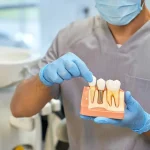Caring for gums is crucial, especially when you face autoimmune conditions. These conditions make your body attack its own tissues. This leaves your gums vulnerable to disease. A periodontist in Norristown, PA, can help protect your smile. They know how autoimmune issues worsen gum problems. You should not ignore any signs of gum disease. Swollen, bleeding gums or pain when chewing are signals for action. A periodontist can offer treatments that work with your body to heal gums. This approach protects your teeth and overall health. Routine check-ups, good brushing, and flossing stop problems before they start. Regular visits ensure any issues get addressed quickly. If you experience any changes in your gums, reach out for expert care. This proactive step brings peace of mind and protects your health. You deserve a healthy, confident smile, even with autoimmune challenges. Taking charge today means healthier gums tomorrow.
Understanding Autoimmune Conditions and Gum Disease
Autoimmune conditions, such as lupus and rheumatoid arthritis, trigger your immune system to attack healthy tissues. This can lead to inflammation and pain, making your gums more susceptible to disease. According to the National Institute of Dental and Craniofacial Research, the inflammation caused by these conditions can speed up the progression of gum disease.
Gum disease, or periodontal disease, is an infection of the tissues that hold your teeth in place. It is usually due to poor oral hygiene habits, which can allow plaque—a sticky film of bacteria—to build up on teeth. This build-up leads to swollen gums, bleeding, and tooth loss. Reducing plaque through good oral hygiene is crucial in managing this condition.
Why Regular Dental Visits Matter
Routine dental visits are essential for everyone, but more so if you have an autoimmune condition. Your periodontist will conduct thorough exams and cleanings to remove tartar, the hardened plaque, which cannot be removed through regular brushing. Consider regular professional cleaning a vital step for preventing gum complications.
Effective Gum Disease Treatments
Gum disease requires targeted treatment to prevent progression. A periodontist might recommend the following:
- Scaling and Root Planing: This deep-cleaning method removes plaque and tartar from below the gum line.
- Medication: Antibiotic gels or oral medication can reduce bacteria and inflammation.
- Surgery: In advanced cases, surgery may be needed to repair supporting tissues.
Even with these treatments, managing an autoimmune condition involves addressing the underlying inflammation. This dual approach can maintain gum health and reduce flare-ups.
Effective Home Care Tips
Taking care of your gums at home plays a significant role in treatment success. Consider the following practices:
- Brush teeth twice daily with a soft-bristled toothbrush.
- Floss daily to remove plaque between teeth.
- Rinse with an antimicrobial mouthwash.
- Follow a balanced diet to support immune health.
These habits enhance the effects of professional treatments and minimize the risk of complications.
Diet and Lifestyle Considerations
Your diet can affect gum health. Foods rich in vitamins and minerals support your immune system and promote healing. Consider including:
- Leafy greens for calcium and folic acid.
- Citrus fruits for vitamin C.
- Nuts and seeds for vitamin E and omega-3 fatty acids.
Additionally, avoid smoking and limit alcohol intake, as these can exacerbate gum disease.
Table: Comparison of Key Autoimmune Conditions and Gum Disease Symptoms
| Condition | Common Symptoms | Gum Disease Impact |
|---|---|---|
| Lupus | Joint pain, rash, fatigue | Increased gum inflammation |
| Rheumatoid Arthritis | Stiffness, swelling, pain | Heightened risk of gum disease |
| Sjögren’s Syndrome | Dry mouth, dry eyes | Reduced saliva, more plaque |
Seeking Professional Help
Finding an experienced periodontist is key in managing gum disease alongside autoimmune conditions. Use reliable resources such as the Centers for Disease Control and Prevention for guidance and support.
Taking these steps ensures you address gum disease with the right approach. Autoimmune conditions require careful management, and giving your gums the care they need is a vital piece of the puzzle. Start today by scheduling a consultation with a qualified periodontist.







